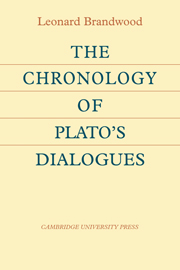Book contents
- Frontmatter
- Contents
- Preface
- 1 Introduction
- 2 L. CAMPBELL
- 3 F. BLASS
- 4 W. DITTENBERGER
- 5 A. FREDERKING
- 6 F. KUGLER
- 7 M. SCHANZ
- 8 E. WALBE
- 9 H. SIEBECK
- 10 C. RITTER (I)
- 11 J. TIEMANN
- 12 G. B. HUSSEY
- 13 H. VON ARNIM (I)
- 14 CH. BARON
- 15 W. LUTOSLAWSKI
- 16 P. NATORP
- 17 G. JANELL
- 18 W. KALUSCHA AND L. BILLIG
- 19 H. VON ARNIM (II)
- 20 C. RITTER (II)
- 21 A. DÍAZ TEJERA
- 22 D. WISHART AND S. V. LEACH
- 23 Conclusion
- Indexes
12 - G. B. HUSSEY
Published online by Cambridge University Press: 07 September 2010
- Frontmatter
- Contents
- Preface
- 1 Introduction
- 2 L. CAMPBELL
- 3 F. BLASS
- 4 W. DITTENBERGER
- 5 A. FREDERKING
- 6 F. KUGLER
- 7 M. SCHANZ
- 8 E. WALBE
- 9 H. SIEBECK
- 10 C. RITTER (I)
- 11 J. TIEMANN
- 12 G. B. HUSSEY
- 13 H. VON ARNIM (I)
- 14 CH. BARON
- 15 W. LUTOSLAWSKI
- 16 P. NATORP
- 17 G. JANELL
- 18 W. KALUSCHA AND L. BILLIG
- 19 H. VON ARNIM (II)
- 20 C. RITTER (II)
- 21 A. DÍAZ TEJERA
- 22 D. WISHART AND S. V. LEACH
- 23 Conclusion
- Indexes
Summary
The year 1889 saw the appearance of a second stylistic inquiry. It is fairly slight, concerning the forms of verbs used to refer to something already said in the dialogue, and not all of these, but only certain past tenses of the passive. There are five types: (a) ἐρρήθη and ῥηθείς (Table 12.1 on p. 93, where these forms are also expressed as a percentage of the total number of references, (b) ἐλέχθη and λεχθείς, (c) προερρήθη and προείρηται together with their participles, (d) λεχθείς and λεχθεῖσα used as an adjective, (e) the perfect passive of λέγω. In the case of the last two types, however, not just instances in references, but all occurrences are reckoned, including the imperative of the perfect passive of λέγω. A further point which should be made is that the reference totals are composed solely of references to the argument, and do not include any except such as go back to full, complete statements of the persons engaged in the discussion. Thus all words are omitted which refer to quotations of poetry, of tradition, or of any composition not original to the speakers of the dialogue. The only exception is the oration of Lysias in the Phdr. This is regarded as a component part of the dialogue, because it is read in full by Phaedrus and plays a prominent part in the succeeding discussion. In the whole argument Phaedrus himself acts as a passive listener and the opinions considered belong either to Socrates or Lysias.
The statistics can probably be accepted as accurate; at least a check of those for the five types in the Phil, showed them to be all correct.
- Type
- Chapter
- Information
- The Chronology of Plato's Dialogues , pp. 92 - 95Publisher: Cambridge University PressPrint publication year: 1990



